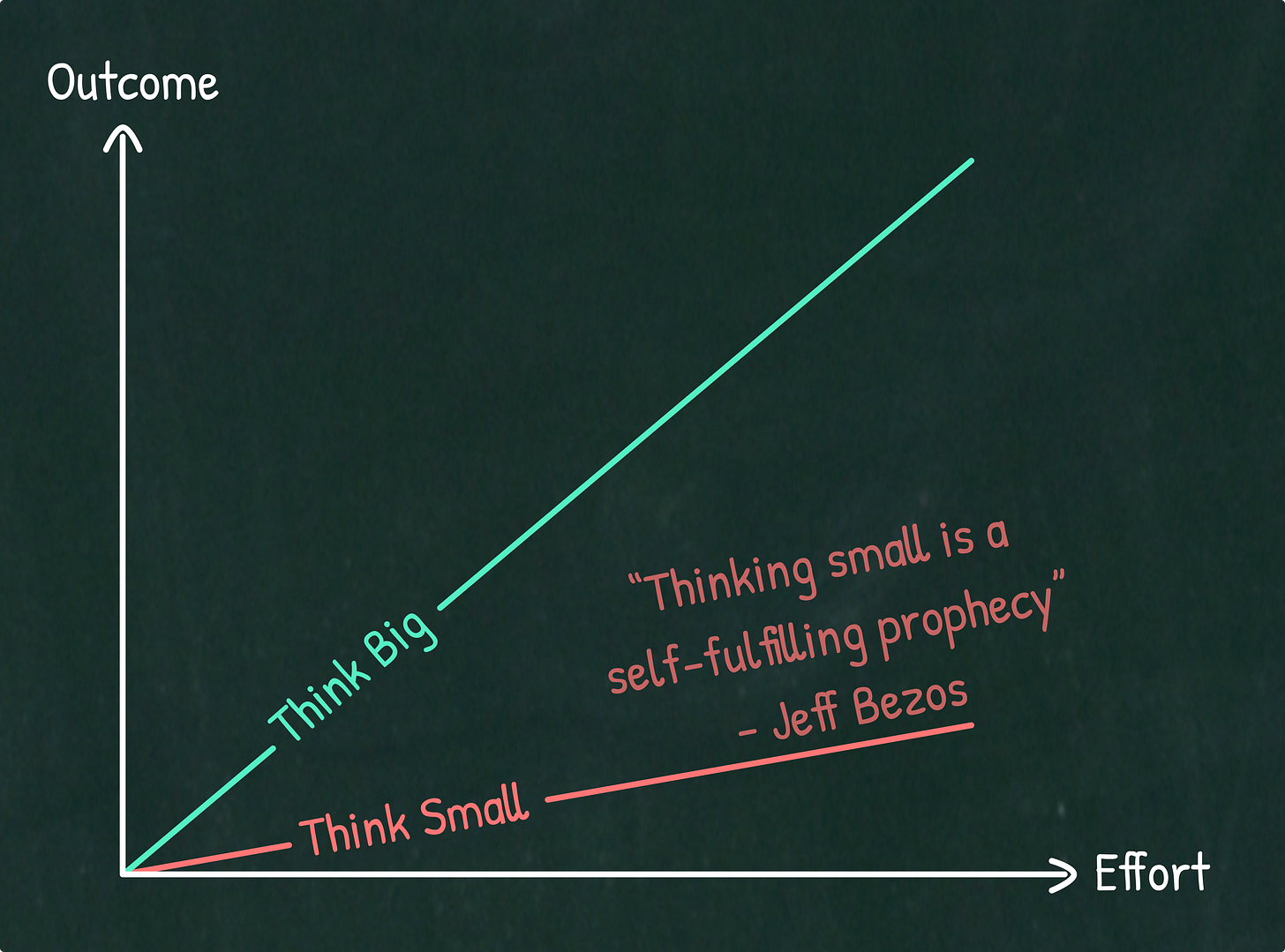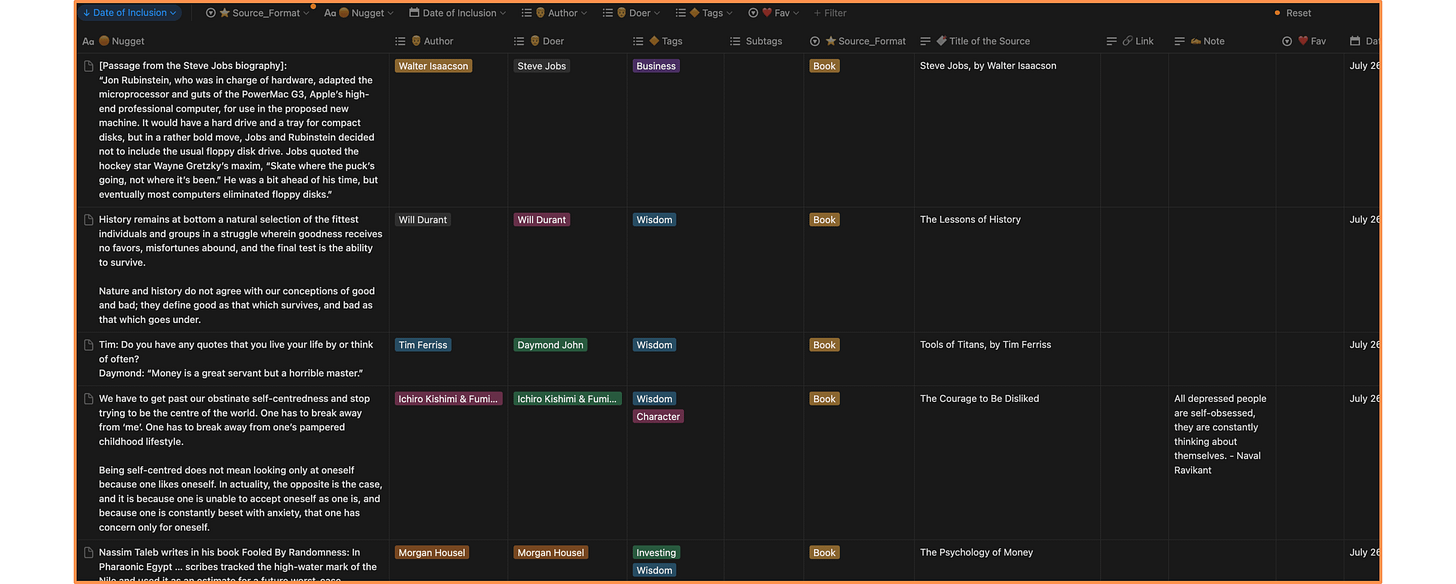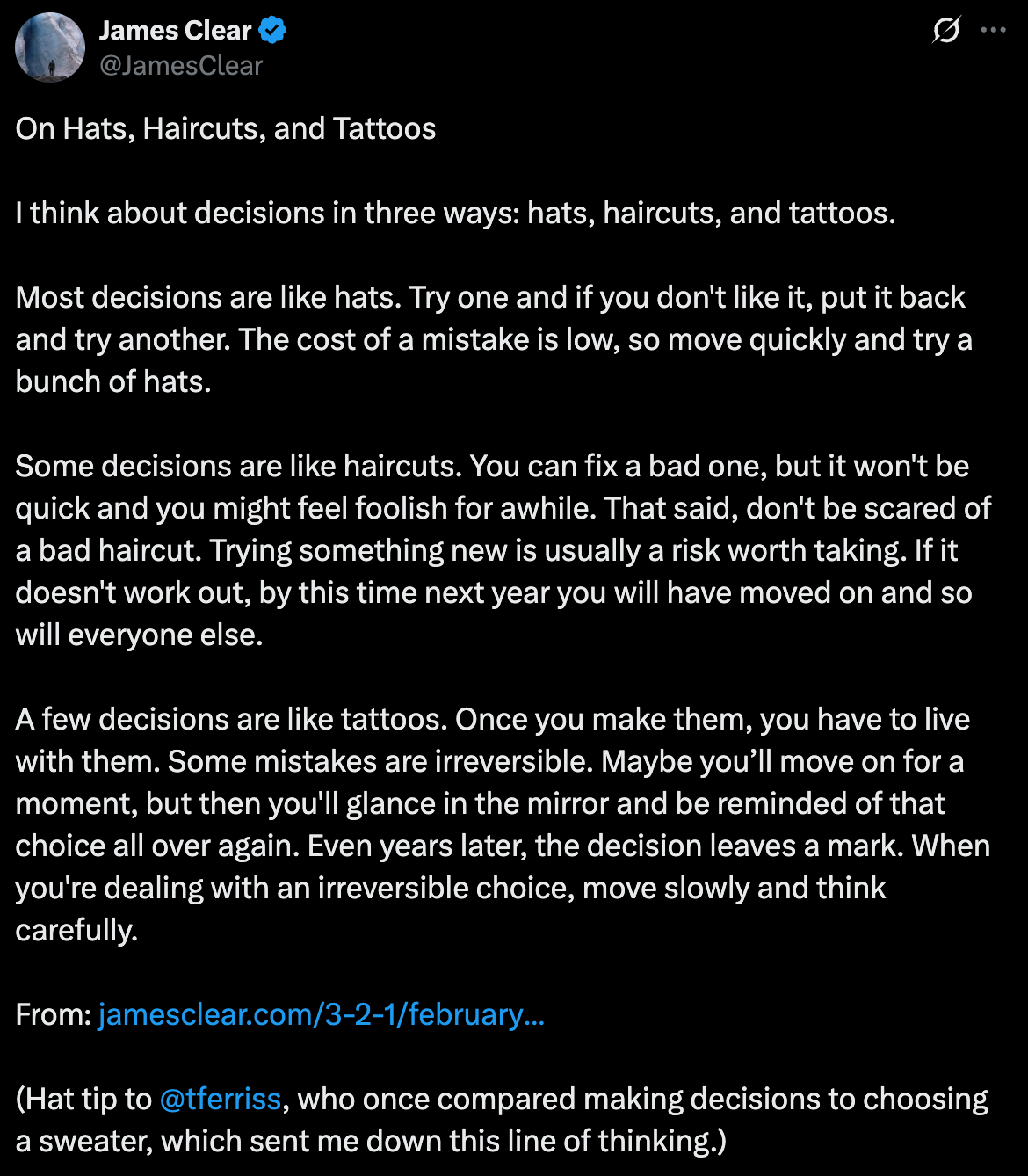What Would It Take to 10x Your Business Idea? (The Power of Thinking Big)
Nugget by Brian Chesky
👋 Hey friend,
I was revisiting some insights from my personal Notebook and I found a great nugget that I saved back in 2024.
It’s about the power of thinking big and self-belief. And it comes from the co-founder of Airbnb Brian Chesky.
I also expanded the insight with an idea I picked from Jensen Huang (founder of Nvidia) and Naval Ravikant.
👤 Doers
💡Nugget
[Lenny — the interviewer]:
A defining characteristic of Brian Chesky, in my mind, is how big you make people think. How you push people to think bigger.
Memories I have of you is... In meetings, we present our goal and you're always saying, "How do we 10X this? What would it take to 10X this idea?"
And somehow we often hit these crazy goals—after you 10X'd them — or sometimes just double them.
What have you learned about the power of setting really ambitious goals, but also finding the balance with not demoralizing people if they don't hit these really ambitious goals?🟠 Brian Chesky:
As you know, there was a saying inside of Airbnb, it was "add a zero." Add a zero at the end, which is: to imagine something an order of magnitude bigger.
The exercise isn't necessarily to say: if people say they want to hit a goal, I say, okay, I added a zero, you have to hit that goal. It's more the exercise of what it would take to be 10X bigger or do something 10 times better. Because what you find is [that] when you push people, they will sometimes think about the problem differently. And one of the best ways to get unstuck from a problem is to imagine a 10X scale or 10X better or 10X faster. Where you can't do the current process to do it. You have to think differently about the problem.
"A change in perspective is worth 80 IQ points."
- Alan KayAnd to think differently about the problem [it] means you have to deeply understand the problem.
"If I had an hour to solve a problem I'd spend 55 minutes thinking about the problem and five minutes thinking about solutions."
- Albert EinsteinAnd to deeply understand the problem, you have to break it into its components. And we might call this first-principle thinking. What are the foundational elements that comprise this problem and how can we reconstruct them?
Lets see now how Brian takes this idea of thinking big and connects it to self-belief...I remember there was a story about a great basketball coach named John Wooden.
He was one of the winningest basketball coaches, I think, in college basketball history—perhaps the greatest.
And someone asked him once—I'm going to paraphrase what he said: “What is your secret to success?”
And he said: “I just ask my players to do their very best.”
And I remember thinking to myself: That doesn’t sound like the secret to success—asking people to do their best.
But there was an implicit thing that he didn’t say, which is that he saw potential in people that they never saw in themselves.
"He had the attitude that he could do anything, and therefore so can you."
- Elizabeth Holmes (on Steve Jobs) from the book Steve Jobs, by Walter Isaacson.And so the role of a leader is to see potential in people that they may not even see themselves.
And when I tell somebody, “It’s not good enough,”either I’m saying, you’re not good enough, or I’m saying, I believe you have more potential than you’re showing me.
So, in other words: You can push a team, and they could feel demoralized—because they can feel like what they’re doing is not good enough, if they have a fixed mindset.
Or, you create a growth mindset organization—where the more I’m involved, the more I say, “You can do better” it’s because the more I believe in you, and I know that you have more in you.
[Source - Brian Chesky’s New Playbook]
Jensen Huang has a similar take on this idea. He said the following in a conversation with Stripe's founder Patrick Collison...PATRICK COLLISON: You once told me that you really didn’t like firing people and very seldom did it. Can you elaborate on that?
JENSEN HUANG: Well, I’d rather improve you than give up on you. When you fire somebody, you’re kind of saying... Well, a lot of people say “Well, it wasn’t your fault,” or “I made the wrong choice.” There are very few jobs. Look, I used to clean bathrooms, and now I’m the CEO of a company. I think you could learn it. I’m pretty certain you can learn this.
There are a lot of things in life that I believe you can learn and you just have to be given the opportunity to learn it. I had the benefit of watching a lot of smart people do a lot of things. I’m surrounded by 60 people that are doing smart things all the time. They probably don’t realize it but I’m learning constantly from every single one of them. So I don’t like giving up on people, because I think they could improve. So there’s... It’s kind of tongue in cheek, but people know that I’d rather torture them into greatness.
PATRICK COLLISON: That was the phrase that I was hoping to uncover. Yeah, I remember you mentioned that.
JENSEN HUANG: Yeah. So I’d rather torture you into greatness because I believe in you. And I think coaches that really believe in their team torture them into greatness. And oftentimes they’re so close. Don’t give up. They’re so close. Greatness, it comes all of a sudden. One day it’s like, “I got it.” Do you know what I’m saying? That feeling that you didn’t get it yesterday and all of a sudden one day something clicked, and “Oh, I got it.” Could you imagine if you gave up just that moment right before you got it? So I don’t want you to give up on that. So let’s just keep torturing you.
[Source - A conversation with NVIDIA’s Jensen Huang]
One last idea on the power of self-belief and thinking big...
"You’ve got one life on this planet. Why not try to build something big? This is the beauty of Elon Musk, and why I think he inspires so many people, it’s just because he takes on really, really big audacious tasks. And he provides an example for people to think big.
And it takes a lot of work to build even small things. I don’t think the corner grocery store owner is working any less hard than Elon Musk, or pouring any less sweat and toil into it. Maybe even more.
But for whatever reason, education, circumstance, they didn’t get the chance to think as big, so the outcome is not as big. So, it’s just better to think big. Obviously, rationally, within your means, stay optimistic."
- Naval Ravikant (source)📙 Doers Notebook
All the nuggets I’ve picked for the past 5 years are saved and classified in a searchable Database, which (as of August 2025) contains 4,595 timeless ideas (sourced directly from the most influential doers and entrepreneurs — captured on books, interviews/podcasts, tweets, and articles).
I call this Database The Doers Notebook, and it’s open for anyone who wants it.
🤔 Why did I build this?
Well, as the Latin motto goes, “A chief part of learning is simply knowing where you can find a thing.” And since it’s all 🔎 searchable, we only need to type a keyword to immediately get a list of insights related to it!
For instance, if I’m unsure about how to get more sales in my business, I can simply type the word “sales” and immediately get 126 insights! (search results that contain the keyword “sales”). In this case from Jim Edwards, Peter Thiel, Naval Ravikant, Paul Graham, Sam Altman, Balaji Srinivasan, Nassim Taleb, and many other remarkable individuals.
It’s like having a second brain 🧠 from which we can pull wisdom on demand, to help us significantly decrease the error rate in our judgment and also get new perspectives on how to solve specific problems.
“In an age of infinite leverage [code and media], judgment is the most important skill.”
- Naval RavikantIf you want to see The Doers Notebook in action, I made a video where I typed the keywords “sales” and “creative”, and I went through the list of insights (that contain those keywords).
But if you want to check out the database directly, just go to DoersNotebook.co
💥 Stuff I Loved
Talk you soon,
Your nuggets friend Julio :)












To me, this is a great sales pitch.
If it weren't for my lack of pocket money (and the price), I would buy it immediately.